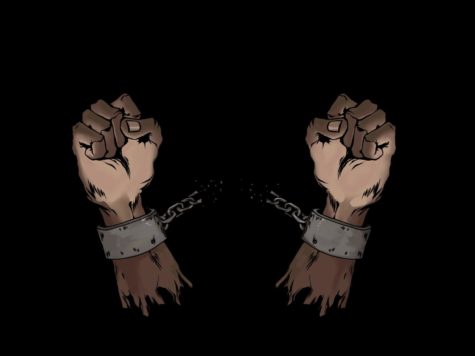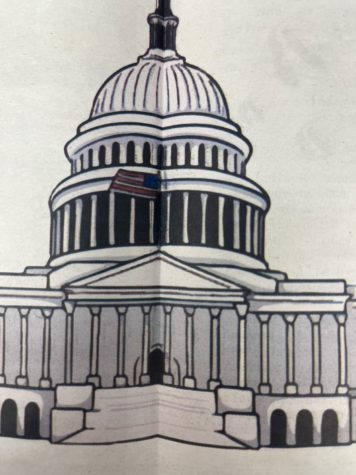The roles of romance and friendship
Valentine’s Day is past, leaving many students wondering what those relationships mean in their lives. According to a recent survey of 296 Liberty students, 26% of Patriots are in a romantic relationship, 10% say “it’s complicated”, and the remaining 64% are single. This holiday is not only about romance, however, and friendships are equally, if not more, important. Join the Patriot Press as we explore how romance and friendship impact the Liberty community.
May 9, 2017
Romantic Relationships
When you think of romantic relationships, you probably envision loving couples holding hands in the hall or grand gestures complete with roses, boxes of chocolates, and oversized Costco teddy bears. However, relationships consist of more than just these public displays of affection, depending largely on the compatibility and attraction between two people. Often times, friendship is an essential quality to a healthy, stable relationship.
“I think that being friends with someone is a really important component to being in a relationship,” senior Riley McNutt said. “You don’t want to be in a relationship with someone that you’re not best friends with, and you need to know the person before you can love them.”
Senior Kendall Aramaki agrees, explaining that her history of friendship with senior Max Sands has strengthened their romantic relationship, which has lasted over two years.
“We actually dated in first grade, and we have been friends since then. I think it’s a lot better when you have that basis of friendship before you jump into a romantic relationship,” Aramaki said.
The intimacy of having both a close companion and significant other in the same person makes spending time with them all the more fun, as many partners have observed.
“You have a best friend that you can hang out with all the time and just do fun things with,” McNutt said.
Senior Jill Polsin, who has been dating senior Garrett Waters for over a year, also highlights the advantages of having a romantic partner.
“When I want to go on random adventures, I just say, ‘Garrett, I want to go to Taco Bell right now!’ and he’ll answer, ‘Okay, I’ll be there in fifteen minutes,’” Polsin said.
Along with providing a partner for adventures, this underlying friendship between significant others can act as a support mechanism. This is the case for Polsin in her relationship with Waters.
“He actually cares about me. When I’m stressed out, my parents tell me to just calm down, but he’ll say, ‘I can understand what you’re going through,’” Polsin said.
Despite the numerous benefits of romantic relationships, they can be challenging to maintain, especially in high school.
“It’s hard to balance your relationship with other priorities like academics. My boyfriend, Kaeden, is all about robotics, and here I am with cheer, ASB, and DECA. We also go to different schools, so the only time that we see each other is on weekends,” McNutt said. “We have to manage our time and prioritize each other alongside our own interests.”
Serious problems, or more humorous issues, can result from romantic relationships, as explained by Waters.
“I’m late to a solid half of my classes just because I walk with her to her classes and then power-walk to mine,” Waters said.
Whether it’s juggling busy schedules or avoiding tardiness, romantic relationships require both time and effort to keep healthy.
“You just kind of have to make decisions sometimes. You need to make it work on both ends and make sure that everyone gets time,” Sands said.
Maintaining relationships not only requires time and commitment, but also certain character qualities to make sure partners feel respected and loved.
“One of the most important qualities is loyalty. It’s something rare in high school relationships, which is unfortunate. People just hop from one person to the next to please themselves and their physical desires,” McNutt said. “You should find someone who is loyal to you and will be there for you no matter what.”
Aramaki believes that another vital trait in romantic relationships is communication.
“Every relationship has its ups and downs, and if you can communicate then you can work through all your problems and it’s going to be a stronger relationship,” Aramaki said. “The ability to be vulnerable and have those talks is important.”
Overall, open communication between partners is vital to avoiding conflict, McNutt explains.
“When conflict comes up we just talk about it. He’s really good at knowing when I’m upset or when I’m trying to shrug something off, like that classic ‘I’m fine’ that people always say. Guys know when you’re not fine, so he never lets us say goodnight knowing that one of us is upset,” McNutt said. “We make sure that each other is okay in that moment and don’t move on before things are cleared up.”
Platonic Relationships
Sixty-eight percent of Patriots believe that friends are often more similar to each other, while 32% find that opposites are more likely to attract.
Seniors Riley McNutt and Parker Sayers see similarities in their personalities and interests strengthen their friendship.
“We definitely have differences. He has strengths that complement my weaknesses, but I would say that we’re very similar. We’re both very punctual. We’re both very on top of things, organized. We like lists and tasks and ASB,” McNutt said.
Junior Ben Matsche finds differences in viewpoint vital among his friends.
“A good friend is someone who is similar to you but isn’t a ‘yes man’. He doesn’t agree to everything you say. If you’re able to have intellectual conversations without agreeing, then that makes you close,” Matsche said.
Overall, most Patriots find that shared traits are necessary in order to maintain a healthy friendship and simply have fun. Seniors Brendan Chin and Brendan Weibel find that their shared activities—along with dry wit—strengthen their friendship.
“Our sense of humor [unites us]. We also have similar interests, we both play music, and we play a lot of video games. We like to mock everything,” Weibel said.
Having similar interests means many friends’ schedules coincide, giving them opportunities to see each other frequently. McNutt encouraged Sayers to join ASB, which helped make their friendship closer.
“I gave ASB a shot, and now I’ve been in it with her for two years,” Sayers said.”I know her strengths and she knows mine, so when she tells me, ‘You would be really good at this,’ I trust her.”
Despite all the time spent together in ASB, McNutt and Sayers find that hanging out after school is still extremely important.
“We go on fun adventures all the time. We’ll just get in our car, turn on our jams, and drive forever and talk. We get slurpees and random stuff,” McNutt said.
Though relationships grow from spending time with the other person, many students find that their schedule makes any interaction outside of school difficult.
“Oftentimes, I have friends that take advanced courses, and those courses come with a huge load of homework. That work prevents them from doing any social activity after school,” Matsche said. “It makes it harder to connect with friends. The more time you spend together, the more you know each other.”
In addition to time constraints, many students observe that lack of communication can hurt friendships or even create conflict, including juniors Morgan Mills and Kalee Kennedy.
“If you don’t communicate well, the other person may take something the wrong way. It all goes downhill from there,” Kennedy said.
Freshmen Hannah Mattson and Elizabeth Rollison go further, saying that not communicating emotions can lead to distrust among friends.
“People aren’t honest with each other sometimes,” Rollison said. “It’s also important that, if you’ve done something wrong, you own up to what you did and ask for forgiveness before it gets completely blown out of proportion.”
In extreme cases, miscommunication can create unhealthy friendships when one person does not express his or her feelings.
“I’m a pretty passive person, sometimes a doormat I would say. Unhealthy relationships are controlling, and you need to know how to set boundaries for yourself and say ‘No, I want to do this.’ You have to learn to say no,” Rollison said.
Mills has also observed how those unhealthy interactions often benefit only one person.
“Only one person is giving, and the other person is taking. Eventually the one who’s giving gets fed up with it, so they fight, and that’s the end of the friendship,” Mills said.
However, when friends discuss their issues with each other, conflicts can be resolved and the negative effects of miscommunication averted, like in Matsche’s experience.
“You always have to talk it out, and make sure to keep an open mind. That’s kind of an arbitrary sentence, but it’s the truth,” Matsche said. “If you have open lines of communication and open minds, you can settle almost any conflict.”
In the end, best friends can have lasting impact on each other’s lives
during high school and beyond, helping each other survive as students and develop as people.
“I look up to Riley because she has impacted my life in such a great way,” Sayers said. “I’m so grateful for our friendship where it’s been and where it’s going to be in the future, and I can only hope that it will continue to get stronger as the years go by.”









